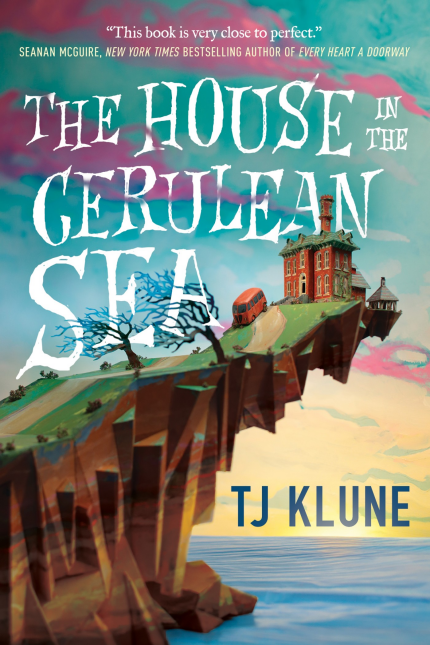The House in the Cerulean Sea, by T.J. Klune

The House in the Cerulean Sea by T.J. Klune
My rating: 5 of 5 stars
»We are who we are not because of our birthright, but because of what we choose to do in this life. It cannot be boiled down to black and white. Not when there is so much in between. You cannot say something is moral or immoral without understanding the nuances behind it.”«
From a world obviously different from ours (magic and magical beings exist there!) but closely related to ours, in T.J. Klune’s “The House in the Cerulean Sea” we are told a modern fairy tale about an orphanage and its inhabitants.
Linus Baker, a caseworker of the “Department in Charge Of Magical Youth” is charged to investigate an orphanage under the wings of Arthur Parnassus who is overseeing the well-being of six especially dangerous orphaned children – one of them being the devil’s child!
What Linus discovers, though, is completely different from what he expected…
First and foremost this is a book about kindness and love. There isn’t much “action” because this is a book that lives from the loves it exudes: There is the “master” of the house, Arthur, who is much more of a teacher, a confessor, a father figure to his young charges.
There is also the benevolent island sprite who is protecting the orphanage and all inhabitants of the island. An island that is lovingly depicted as a mixture of dense forest, blooming meadows and gardens (tended to by Thalia the gnome, one of the orphans).
In stark contrast to that is “Mr. Baker” who is suspicious of the freedoms granted to the kids, who relies on his voluminous “Rules and Regulations” and a form of self-isolation that leads to a warped kind of objectivity.
Mr. Baker, who is always formally dressed, is distant to the kids in the beginning because in contrast to the colourful sun-shiny island, he comes from the city which seems to be always grey (or even: black and white), rainy and adversarial.
Mr. Baker’s transformation into Linus the adventurer – that is what we’re witnessing and the way Linus “heals” and finds a new life for himself while not forgetting about the children (and Arthur!) is the destination – just like in travel!
»“Severed heads?” Linus asked in a strangled voice. Lucy sighed. “Just representations of my enemies. The Pope. Evangelicals who attend megachurches. You know, like normal people have.”«
The way those children – who mostly have suffered terribly before – open up to Linus and slowly but inevitably grow on him and the way he, Linus, grows and allows himself to grow close to them, that is why this lovely “quiet” little book is indeed a gem.
As a bonus, there’s also some very nice and sweet LGBT* representation.
Linus’ interactions with “Extremely Upper Management” and the paths he chooses for his personal life as well as his calling are further helping the “message” of this book and, at the same time, disprove those zealous and self-righteous reviewers thinking this book robs anyone of their stories.
Yes, Klune states this book was influenced by the horrible “residential school” system in Canada – but in a way that makes it very clear that he actually researched those schools and the atrocities committed in them (unsurprisingly administered by the Christian churches).
Klune neither condones nor excuses this system that was wrong to its core. In contrast to it he writes of an orphanage that’s more of a loving home than anything else.
He does not take away anyone’s own voice to describe or write about that system. He creates a different system (though one which is also wrong at its core!) in a different world and alludes at overcoming that inhumane system.
When all is said and done, this is a wonderful, wholesome book about all kinds of love and that garners five out of five stars from me.
“Thank you.” “For what?” “This. Everything. All this color.”
Ceterum censeo Putin esse delendam
View all my reviews